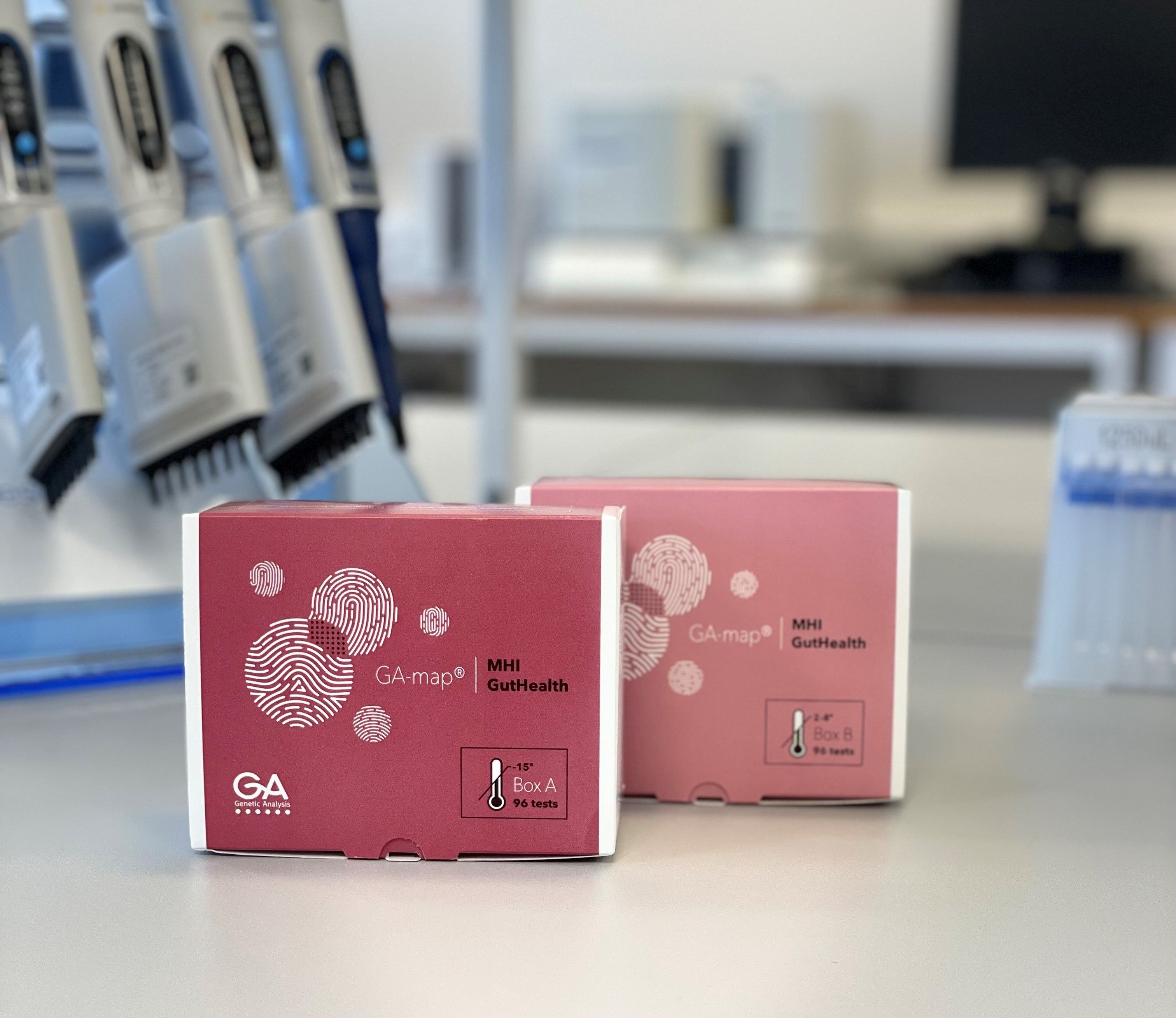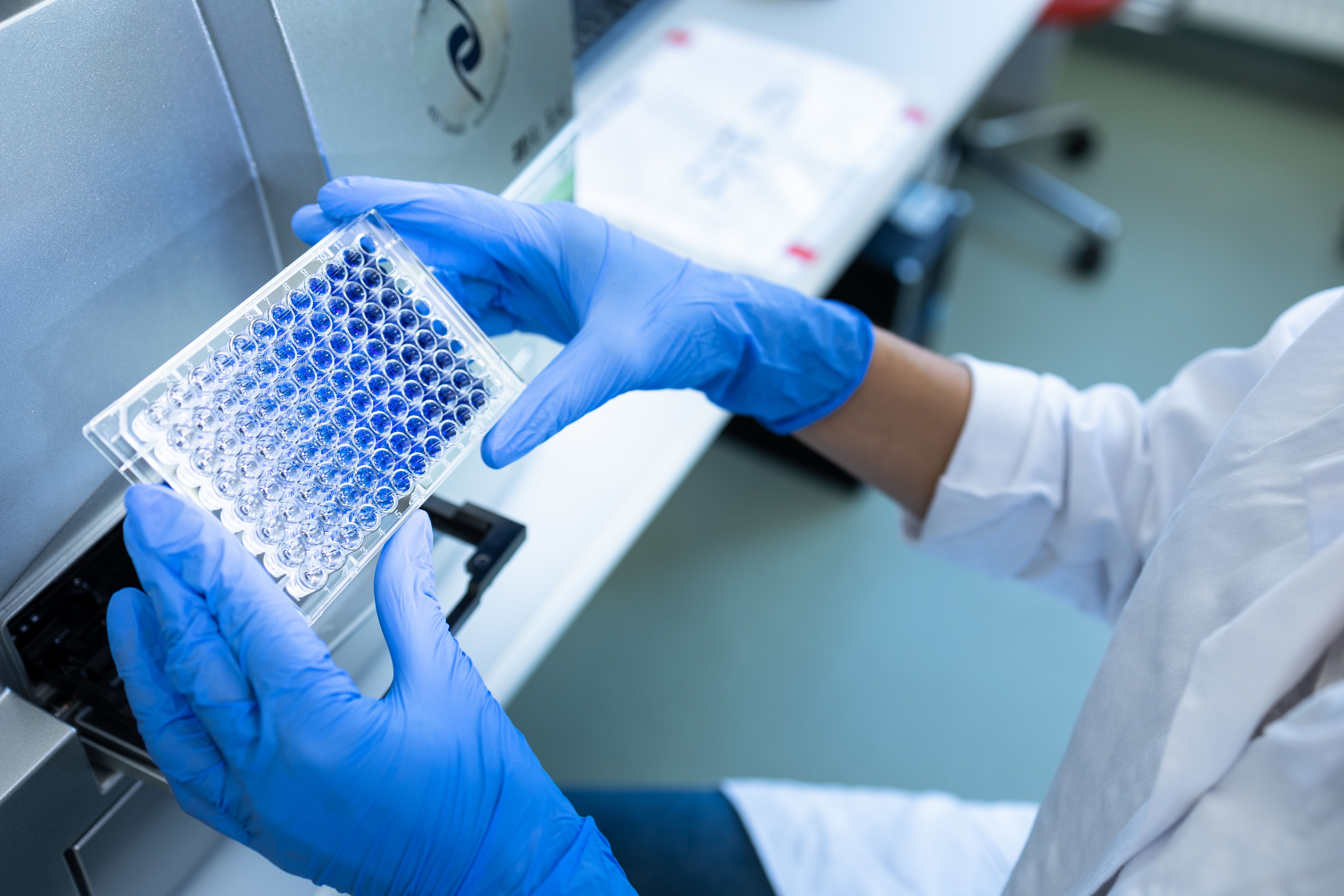GA-map® MHI GutHealth: Transforming Microbiome Health Into a Single Score

A New Step Forward in Measuring Antibiotic-Induced Microbiome Imbalances
Genetic Analysis has launched the GA-map® MHI GutHealth reagent kit, a powerful new tool that simplifies microbiome assessment by providing clinically actionable insights through a single, interpretable score of gut health.
The kit is intended for use in research and clinical development to monitor microbial balance in stool samples. It is particularly valuable in contexts where the gut microbiota is known to be disrupted — for example, following antibiotic treatment — and in efforts to evaluate therapies aimed at restoring a healthy microbiome.

The GA-map® MHI GutHealth test has been developed in collaboration with Ferring Pharmaceuticals.
By integrating the Ferring Microbiome Health Index (MHI™) onto the GA-map® platform, the kit provides researchers and laboratories with a standardized way to assess gut health. This is especially important for longitudinal monitoring in patients, multi-center studies, and large population cohorts.
The Origin of MHI: From Research to Validated Biomarker
The Microbiome Health Index (MHI) originates from a 2021 study published in Frontiers in Microbiology: “Development and Validation of a Novel Microbiome-Based Biomarker of Post-antibiotic Dysbiosis and Subsequent Restoration.”
In this study, researchers focused on patients with recurrent Clostridioides difficile infection (rCDI) participating in clinical trials of live biotherapeutic products (LBPs). They found that four microbial classes were highly predictive of microbiome disruption and restoration:
- Bacteroidia and Clostridia – typically reduced during dysbiosis
- Gammaproteobacteria and Bacilli – often increased after antibiotic exposure
By combining the relative abundances of these classes, the team developed the MHI-A (Microbiome Health Index – Antibiotics). This univariate biomarker proved highly effective at distinguishing between healthy and disrupted microbiomes, achieving near-perfect accuracy in validation studies of rCDI patients.
While validated in this clinical population, the potential uses of MHI are much broader. Its ability to reflect general gut microbial balance means the index may serve as a valuable marker across a wide range of conditions where the microbiome is altered.
Owned by Ferring Pharmaceuticals, the MHI is licensed to Genetic Analysis on a non-exclusive basis. In the newly launched GA-map® MHI GutHealth reagent kit, MHI is adapted to the GA-map® platform, making the biomarker accessible to laboratories as part of a standardized workflow.
How the GA-map® Platform Works
The GA-map® platform substantiates the new GA-map® MHI GutHealth reagent kit. Unlike sequencing-based methods, which rely on bioinformatics pipelines and evolving reference databases, GA-map® employs a probe-based, targeted analysis of the 16S rRNA gene.
- Broad coverage: GA-map® targets seven hypervariable regions (V3–V9) of the 16S rRNA gene. The patented “Cover-All” primers capture more genetic variation than the commonly used amplicon sequencing methods.
- High specificity: Probes can detect single-nucleotide differences, enabling precise bacterial identification at species-level resolution.
- Robust workflow: The analysis uses PCR and Luminex® instruments already common in many labs, followed by automatic interpretation through GA-map® software.
This design ensures that the GA-map® system delivers standardized, reproducible, and clinically interpretable results, making it especially suitable for translating biomarkers like MHI into real-world applications.

Benefits of Employing GA-map® Technology
The newly published GA-map® whitepaper highlights several advantages of the platform:
- No dedicated instrumentation required – runs on widely used MAGPIX® or Luminex® 200™ systems.
- Reproducible and independent of third-party databases – avoids the shifting interpretations common in sequencing-based approaches.
- Built on clinically validated reference models – results are contextualized against large healthy population cohorts.
- Clear, user-friendly outputs –scores and microbial profiles are provided in easy-to-interpret reports.
By combining these benefits with the MHI algorithm, the GA-map® MHI GutHealth reagent kit provides laboratories with a ready-to-use, standardized biomarker assay for gut health measurement and monitoring in antibiotic-associated microbiome disruptions.
GA-map® MHI GutHealth: Intended Use and Application Areas
The primary intended use of the GA-map® MHI GutHealth reagent kit is to assess gut microbial balance, particularly in settings where the microbiome may be disrupted or in need of monitoring.
Validated in patients with recurrent C. difficile infection (rCDI), the test demonstrates strong performance in identifying antibiotic-associated microbiome disruptions and monitoring restoration following microbiome-directed therapies.
Beyond rCDI, the potential applications of the test include:
- Antibiotic stewardship – monitoring microbiome disruption and recovery after antibiotic use
- Fecal microbiota transplantation (FMT) – evaluating treatment response and durability
- Probiotics and live biotherapeutics development – assessing effectiveness of microbiota-based interventions
- Clinical studies in groups exposed to multiple antibiotic treatments – including Graft-versus-Host-Disease, MDRO-colonised patients and immunocompromised patients.
- Metabolic and systemic conditions – investigating associations between microbiome imbalance and metabolic or neuroimmune diseases
- Large cohort and epidemiological studies – applying a standardized biomarker across populations for comparative research
By providing a single, quantitative gut health score, the kit offers an invaluable tool for researchers, clinicians, and developers of microbiota-targeted therapies.
Looking Ahead: From Metric to Milestone
The launch of the GA-map® MHI GutHealth reagent kit represents a milestone in microbiome diagnostics. By combining the licensed MHI biomarker with the robust GA-map® platform, Genetic Analysis delivers a solution that bridges the gap between complex microbiome data and clear clinical utility.
While its validation in rCDI patients provides a solid starting point, the broader potential applications are vast — spanning therapy monitoring, disease research, and public health studies. As adoption grows, the GA-map® MHI GutHealth test could become a cornerstone biomarker for gut microbiome health worldwide.
